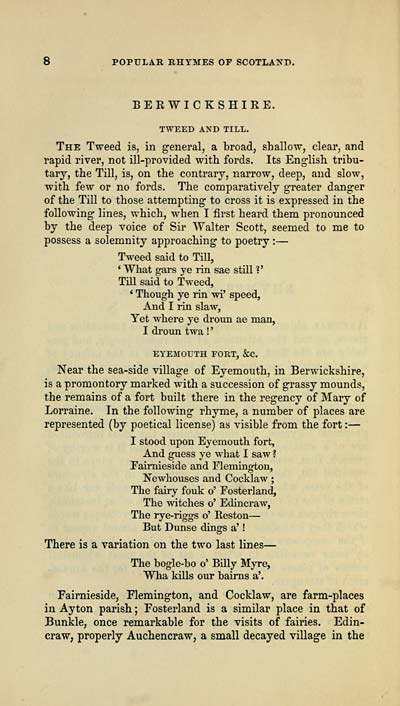Download files
Complete book:
Individual page:
Thumbnail gallery: Grid view | List view

POPULAR RHYMES OF SCOTLAND.
BERWICKSHIRE.
TWEED AXD TILL,
The Tweed is, in g-eneral, a broad, shallow, clear, and
rapid river, not ill-provided with fords. Its English tribu-
tary, the Till, is, on the contrary, narrow, deep, and slow,
with few or no fords. The comparatively greater danger
of the Till to those attempting to cross it is expressed in the
following lines, which, when I first heard them pronounced
by the deep voice of Sir Walter Scott, seemed to me to
possess a solemnity approaching to poetry : —
Tweed said to Till,
* What gars ye rin sae still ?'
Till said to Tweed,
' Though ye rin wi' speed,
And I rin slaw.
Yet where ye droun ae man,
I droun twa ! '
EYEMOUTH FORT, &C.
Near the sea-side village of Eyemouth, in Berwickshire,
is a promontory marked with a succession of grassy mounds,
the remains of a fort built there in the regency of Mary of
Lorraine. In the following rhyme, a number of places are
represented (by poetical license) as visible from the fort : —
I stood upon Eyemouth fort,
And guess ye what I saw ?
Fairnieside and Flemington,
Newhouses and Cocklaw ;
The fairy fouk o' Fosterland,
The witches o' Edincraw,
The rye-riggs o' Reston —
But Dunse dings a' !
There is a variation on the two last lines —
The bogle-bo o' Billy Myre,
Wha kills our bairns a'.
Fairnieside, Flemington, and Cocklaw, are farm-places
in Ayton parish ; Fosterland is a similar place in that of
Bunkle, once remarkable for the visits of fairies. Edin-
craw, properly Auchencraw, a small decayed village in the
BERWICKSHIRE.
TWEED AXD TILL,
The Tweed is, in g-eneral, a broad, shallow, clear, and
rapid river, not ill-provided with fords. Its English tribu-
tary, the Till, is, on the contrary, narrow, deep, and slow,
with few or no fords. The comparatively greater danger
of the Till to those attempting to cross it is expressed in the
following lines, which, when I first heard them pronounced
by the deep voice of Sir Walter Scott, seemed to me to
possess a solemnity approaching to poetry : —
Tweed said to Till,
* What gars ye rin sae still ?'
Till said to Tweed,
' Though ye rin wi' speed,
And I rin slaw.
Yet where ye droun ae man,
I droun twa ! '
EYEMOUTH FORT, &C.
Near the sea-side village of Eyemouth, in Berwickshire,
is a promontory marked with a succession of grassy mounds,
the remains of a fort built there in the regency of Mary of
Lorraine. In the following rhyme, a number of places are
represented (by poetical license) as visible from the fort : —
I stood upon Eyemouth fort,
And guess ye what I saw ?
Fairnieside and Flemington,
Newhouses and Cocklaw ;
The fairy fouk o' Fosterland,
The witches o' Edincraw,
The rye-riggs o' Reston —
But Dunse dings a' !
There is a variation on the two last lines —
The bogle-bo o' Billy Myre,
Wha kills our bairns a'.
Fairnieside, Flemington, and Cocklaw, are farm-places
in Ayton parish ; Fosterland is a similar place in that of
Bunkle, once remarkable for the visits of fairies. Edin-
craw, properly Auchencraw, a small decayed village in the
Set display mode to: Large image | Transcription
Images and transcriptions on this page, including medium image downloads, may be used under the Creative Commons Attribution 4.0 International Licence unless otherwise stated. ![]()
| Early Gaelic Book Collections > J. F. Campbell Collection > Popular rhymes of Scotland > (16) |
|---|
| Permanent URL | https://digital.nls.uk/81374786 |
|---|
| Description | Volumes from a collection of 610 books rich in Highland folklore, Ossianic literature and other Celtic subjects. Many of the books annotated by John Francis Campbell of Islay, who assembled the collection. |
|---|
| Description | Selected items from five 'Special and Named Printed Collections'. Includes books in Gaelic and other Celtic languages, works about the Gaels, their languages, literature, culture and history. |
|---|

